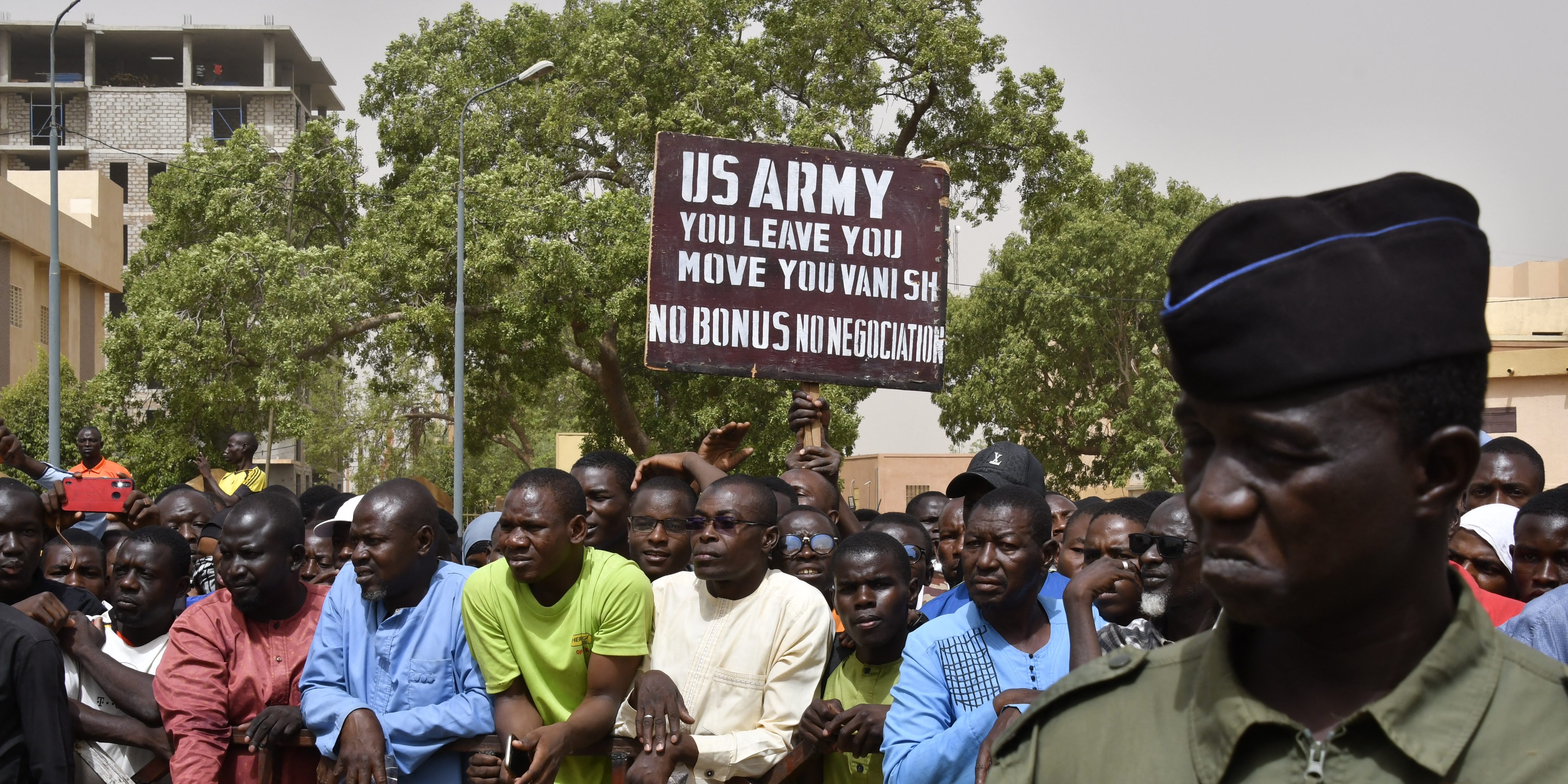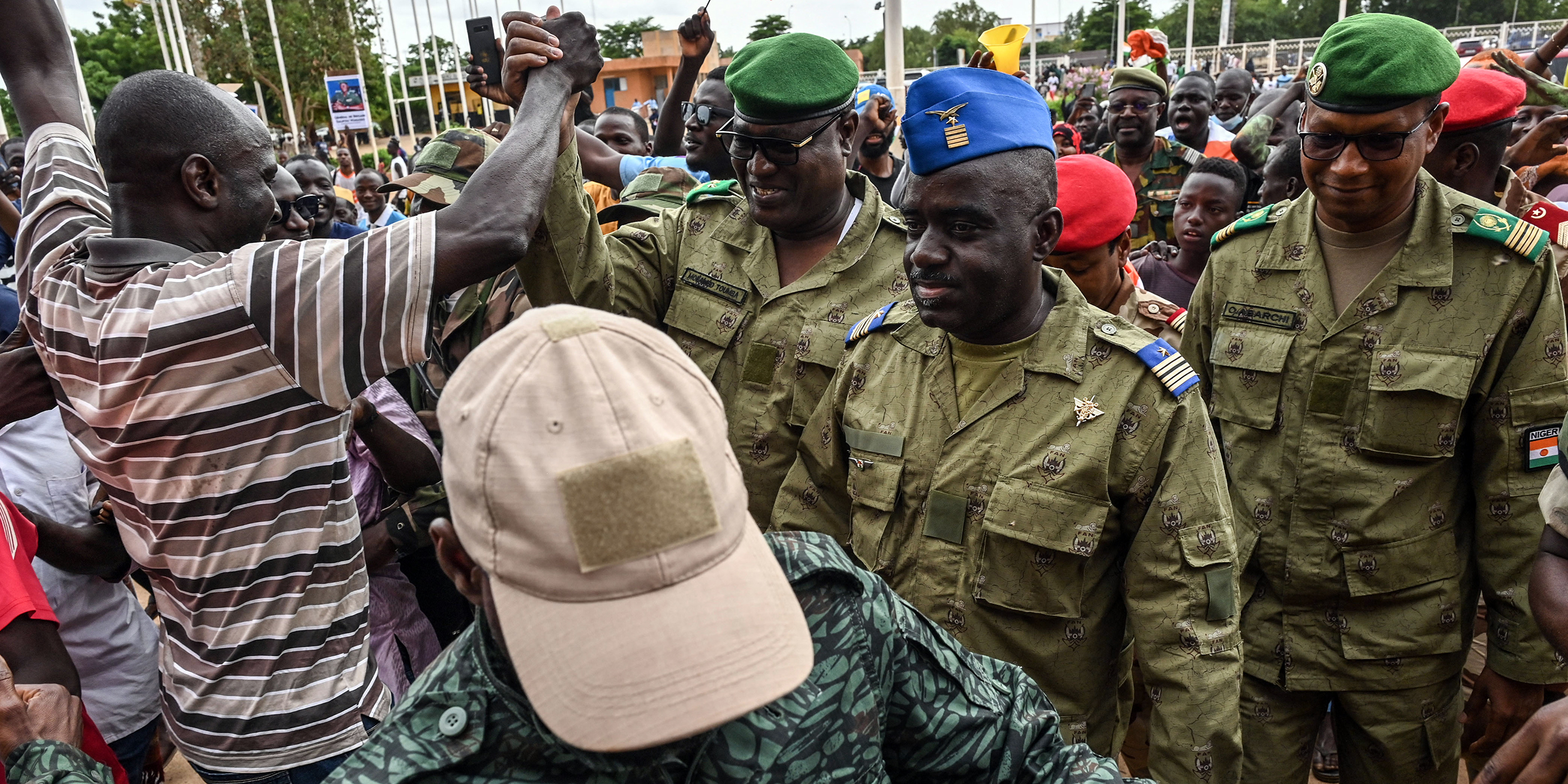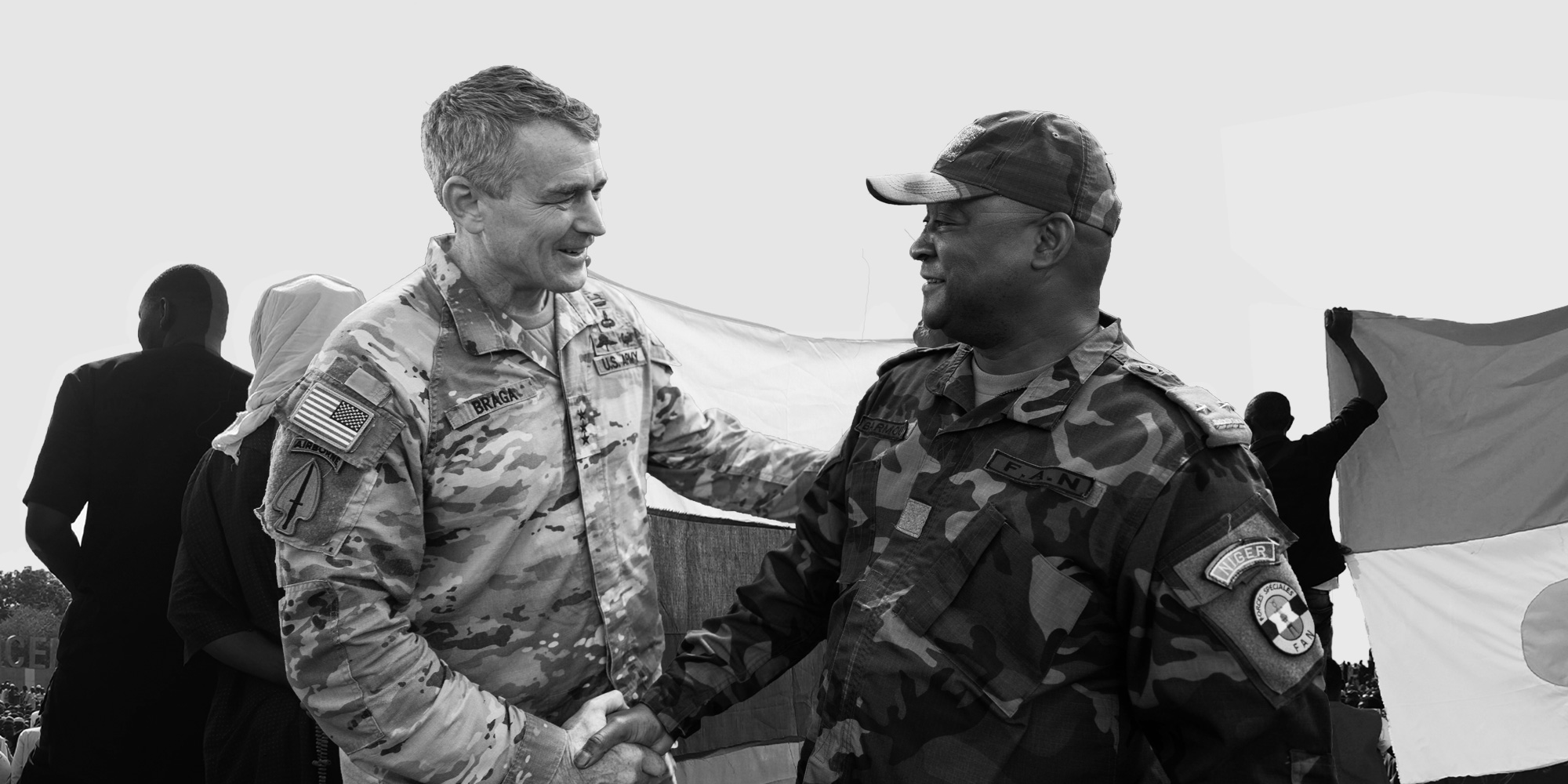For more than a decade, the U.S. had a significant counterterrorism partnership with Niger, with nearly 1,000 American troops stationed at two airbases: one near the capital in the populated south of the country, and another, on the southern fringe of the Sahara Desert, used largely as a base for American drones.
That partnership came to a sudden end this past March 16, when a spokesperson for the country’s ruling junta took to national television to announce that the government was unceremoniously kicking the U.S. military out.
“The government of Niger, taking into account the aspirations and interests of its people, revokes, with immediate effect, the agreement concerning the status of United States military personnel and civilian Defense Department employees,” Col. Maj. Amadou Abdramane said, declaring that the security pact, in effect since 2012, violated Niger’s constitution.
Just days after that announcement, a top Pentagon official went in front of the House Armed Services Committee and misled both Congress and the American people about what was happening, according to a letter sent today to the Pentagon and State Department by Reps. Matt Gaetz, R-Fla., and Jimmy Panetta, D-Calif., and shared exclusively with The Intercept.
“We write to express concern about the Department of Defense (DoD) and the Department of State’s (DoS) internal communication and subsequent relay of inaccurate information to Congress regarding the drawdown of 1,000 U.S. troops from Niger,” reads the letter which was sent to Defense Secretary Lloyd Austin and Secretary of State Antony Blinken on Wednesday.
The “inaccurate information” in question has to do with when, and how, the Pentagon was informed that Niger was booting U.S. troops from its soil.
On March 21, Assistant Secretary of Defense for International Security Affairs Celeste Wallander appeared before the House Armed Services Committee and told Panetta that Niger’s ruling junta “has not asked or demanded” that the U.S. military leave Niger. Almost a month later, Gen. Michael Langley, the chief of U.S. Africa Command, told The Intercept that the U.S. was still attempting to “obtain clarification through diplomatic channels … regarding the Status of Forces Agreement between Niger and the United States.”
But the junta had sent a diplomatic note on March 19, which immediately terminated the Status of Forces Agreement governing U.S. troops in Niger and the Pentagon’s use of military facilities there, according to a letter, also shared with The Intercept, sent to Gaetz by the State Department in response to a formal request for information.
“Given the date DoS provided according to the department’s records … and that Dr. Wallander’s testimony took place days after the information was received by DoS, we have reason to believe that Dr. Wallander misrepresented the situation in Niger,” wrote Gaetz and Panetta.
The State Department refused to provide clarification about its communications with Niger’s junta. “We do not comment on details of diplomatic correspondences,” a department official told The Intercept.
A return receipt shows that Lt. Col. Bryon J. McGarry, a Defense Department spokesperson, read questions sent from The Intercept by email but failed to reply to them.
Before getting ejected from the Sahelian nation, the U.S. had roughly 1,000 military personnel and civilian contractors deployed to Niger, most of them clustered at an air base near the town of Agadez. Known locally as “Base Americaine” but officially called Air Base 201, the outpost served as the linchpin of the U.S. military’s archipelago of bases in North and West Africa and was a key part of America’s wide-ranging surveillance and security efforts in the region. Since the 2010s, the U.S. has sunk roughly a quarter-billion dollars into the outpost. This is in addition to more than $500 million in military aid provided to Niger since 2012.
The U.S. military withdrew its personnel from Niger’s Air Base 101, near the airport in the capital Niamey, in early July. “The effective cooperation and communication between the U.S. and Nigerien armed forces ensured that this turnover was finished ahead of schedule,” Niger’s defense ministry and the Pentagon said in a joint statement. The withdrawal from Air Base 201 is expected to happen in August.
“The United States is proud of the past security cooperation between U.S. forces and Nigerien forces, a partnership which effectively contributed to stability in Niger and the region,” a State Department official told The Intercept. But statistics supplied by the Africa Center for Strategic Studies, a Defense Department research institution, show that terrorist violence in West Africa spiked while that partnership was in effect. Fatalities from attacks by militant Islamist groups in the Sahel, for example, have jumped more than 5,200 percent since 2016.
As violence has spiraled, at least 15 officers who benefited from U.S. security assistance have been involved in 12 coups in West Africa and the greater Sahel during the war on terror, including in Niger last year. At least five leaders of that July 2023 coup received American assistance, according to a U.S. official.
After its protégés toppled Niger’s democratically elected President Mohamed Bazoum last summer, the U.S. spent months avoiding the term “coup” before finally, as mandated by law, suspending approximately $200 million in aid.
In April, following the junta’s public break with the United States, Gaetz’s office issued a report chronicling U.S. troops’ inability to access medicine, mail, or other support while deployed to Niger. “The Biden Administration and the State Department are engaged in a massive cover-up,” Gaetz told The Intercept at the time. “They are hiding the true conditions on the ground of U.S. diplomatic relations in Niger and are effectively abandoning our troops in that country with no help in sight.” The Pentagon disputed the allegations.
Gaetz and Panetta called on Austin and Blinken to provide answers about communications between the junta and the United States and copies of relevant correspondence in order to perform their “oversight measures with respect to Dr. Wallander’s testimony.” The lawmakers gave the departments until early September to furnish the information, just days ahead of a September 15 deadline, imposed by the junta, to remove all U.S. troops from Niger.
Latest Stories

AIPAC Millions Take Down Second Squad Member Cori Bush
Bush was early calling for a ceasefire in Israel's war on Gaza. Then AIPAC came after her with millions of dollars.

The U.S. Has Dozens of Secret Bases Across the Middle East. They Keep Getting Attacked.
An Intercept investigation found 63 U.S. bases, garrisons, and shared facilities in the region. U.S. troops are “sitting ducks,” according to one expert.

What Tim Walz Could Mean For Kamala Harris’s Stance on Gaza and Israel
Walz allows for Harris to “turn a corner” in her policy on the war in Gaza, said James Zogby, president of Arab American Institute.







![TOPSHOT - Niger's National Council for the Safeguard of the Homeland (CNSP) Colonel-Major Amadou Abdramane (2nd R) is greeted by supporters upon his arrival at the Stade General Seyni Kountche in Niamey on August 6, 2023. Thousands of supporters of the military coup in Niger gathered at a Niamey stadium Sunday, when a deadline set by the West African regional bloc ECOWAS to return the deposed President Mohamed Bazoum to power is set to expire, according to AFP journalists. A delegation of members of the ruling National Council for the Safeguard of the Homeland (CNSP) arrived at the 30,000-seat stadium to cheers from supporters, many of whom were drapped in Russian flags and portraits of CNSP leaders. (Photo by AFP) / "The erroneous mention[s] appearing in the metadata of this photo by - has been modified in AFP systems in the following manner: [Colonel-Major Amadou Abdramane] instead of [Colonel-Major Amadou Adramane]. Please immediately remove the erroneous mention[s] from all your online services and delete it (them) from your servers. If you have been authorized by AFP to distribute it (them) to third parties, please ensure that the same actions are carried out by them. Failure to promptly comply with these instructions will entail liability on your part for any continued or post notification usage. Therefore we thank you very much for all your attention and prompt action. We are sorry for the inconvenience this notification may cause and remain at your disposal for any further information you may require." (Photo by -/AFP via Getty Images)](jpg/gettyimages-1581236163.jpg)
